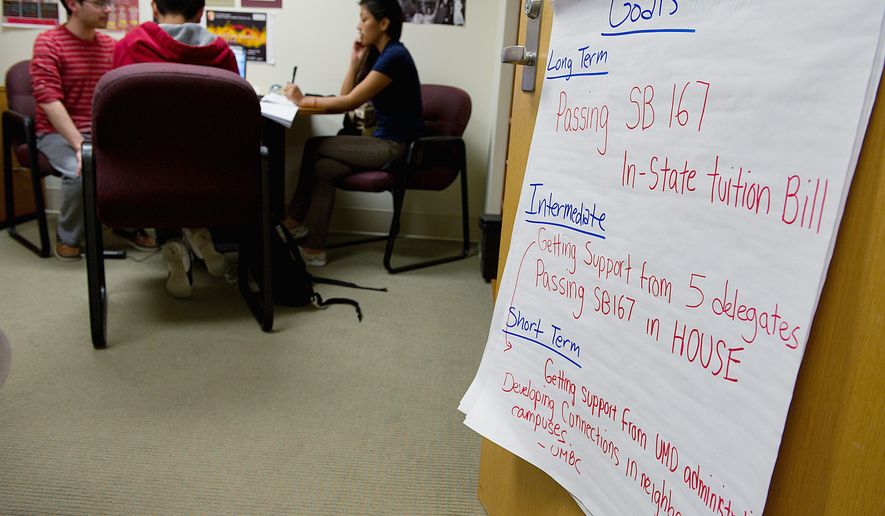ANNAPOLIS | Maryland legislators are nearing a final vote on granting in-state college tuition for many illegal immigrants, making the state one of several across the U.S. taking up local versions of the federal DREAM Act that failed in Congress.
The debate in the Democrat-controlled Assembly continues Wednesday when the House Ways and Means Committee considers a version of the legislation recently passed by the state Senate.
Supporters say the bill will help the state economy by expanding access to affordable education and creating a better-prepared work force. But critics say the first priority is American students, especially when Maryland and other states are wrestling with budget shortfalls.
“We need to take care of the kids who are here legally first,” said Delegate Andrew Serafini, Washington Republican. “Even if you could argue for the merits of it, we just cannot afford to continue to expand government and programs like this.”
State analysts have estimated the legislation would result in increased enrollment and mandatory education funding, costing the state an extra $800,000 by fiscal 2012 and $3.5 million by fiscal 2014.
The federal DREAM Act died last year in Congress when the Senate failed to advance it.
But in this week alone, the Oregon Senate voted in favor of granting in-state tuition to some illegal immigrants, sending the legislation to its House. And in Kansas, GOP lawmakers are attempting to repeal a 2004 law allowing some illegal immigrants to pay the lower, in-state tuition at state colleges and universities.
Democrats in New York’s legislature have introduced a bill that grants illegal immigrants with high-school degrees access to college scholarships and financial aid. However, state Sen. Bill Perkins, a Manhattan Democrat and the bill’s sponsor, has acknowledged the bill, which would also grant driver’s licenses, will be difficult to pass. Much of the legislation focuses on children brought to the U.S. illegally by their parents.
The Maryland Senate passed its legislation March 14, but only after amending the provision that granted in-state status at four-year schools.
If signed into law, the bill would grant reduced community-college tuition for illegal immigrants who have received a Maryland diploma or GED since 2008, attended an in-state secondary school for at least three years since 2005, and can document that they or a legal guardian have filed annual state income tax returns or had state income tax withheld throughout that span.
Students would retain in-state status if they graduate to a public four-year college in the state. The law would go into effect for students entering college this fall and would require that they sign an affidavit stating they will seek permanent status within 30 days of becoming eligible.
States are already required by federal law to provide K-12 education for children of illegal immigrants.
“We invest in kids for their whole public-school career and we tell them … the path to success is to go to college,” said Delegate Jolene Ivey, Prince George’s Democrat. “These particular children who had no choice to be in this country … the rug is snatched from under them by the unreasonably high cost of college.”
Most of the state’s public universities charge in-state students roughly half of what they charge those from other states, a difference of about $10,000 a year. Community colleges have tiered rates for in-county, out-of-county and out-of-state students, with most out-of-state students paying more than double the in-county cost.
The House and Senate passed a similar tuition-break bill in 2003 that was vetoed by then-Gov. Robert L. Ehrlich Jr., a Republican. The House passed another bill in 2007 that died in the Senate.
House Ways and Means Chairwoman Sheila Hixson, Montgomery Democrat, said Tuesday she expects the bill to pass in her committee and in the full 141-member chamber. Democratic leaders said they are still gauging the bill’s full House support.
“It’s passed here twice, so we don’t get the same push-back that you get in the Senate,” Miss Hixson added. “But there’s always a very vocal group that certainly will be up and talking against it.”
• David Hill can be reached at dhill@washingtontimes.com.




Please read our comment policy before commenting.